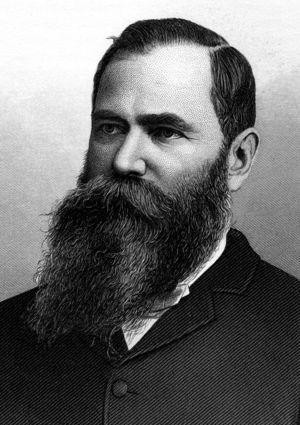James Luckie
- This article is about James B. Luckie (1833–1908). For his sons, see James Luckie Jr or James A. Luckie.
James Buckner Luckie (born July 16, 1833 in Newton County, Georgia; died December 11, 1908 in Birmingham) was a physician and politician who founded the Birmingham Fire Department and served as its first chief.
Luckie was the son of Judge William Dickinson Luckie and his wife, the former Eliza Buckner. He attended public schools to age sixteen, and the spent two years at the Gwinnett Institute until ill health forced him to withdraw. After recovering he began to study medicine under John Hendrick. In 1853 he began attending regular medical lectures in Augusta, Georgia. He went on to graduate from the Pennsylvania Medical College in 1855 and returned home to Newton County to open a professional practice. After a year he relocated to the town of Orean in Pike County, Alabama. His first marriage, to Eliza Imogen Fielder of Georgia was solemnized on February 15, 1859. She bore him a daughter before her death a year later.
In May 1861 Luckie raised a company of "Pike Volunteers" and led them in drills before bringing the unit to Montgomery. Due to a shortage of arms, however, they were mostly sent back home. Luckie subsequently enlisted with the 23rd Alabama Infantry and was assigned to Company B as a private on December 1. By March 1862 he had earned extra pay as an assistant surgeon at the General Hospital in Knoxville, Tennessee. On May 29 he was assigned to medical director S. A. Smith and was formerly appointed an assistant surgeon. He served as medical purveyor to General E. Kirby Smith's Army of East Tennessee during their campaign into Lexington, Kentucky in the summer of 1862 and was there promoted to inspector of hospitals. After the unit returned to Knoxville, Luckie was made chief of the Bureau of Smallpox and Vaccination.
He was assigned to Hilliard's Legion of the 3rd Alabama Battalion in April 1863 and promoted to field surgeon on October 9. He spent the remainder of the war with Gracie's Brigade in the 60th and 43rd Regiments, Alabama Infantry. He was granted a 40-day furlough in 1864 due to dysentery, but returned to the field before the end of October. His unit was among those that surrendered at Appomattox Court House in 1865.
After the war, Luckie moved to Pine Level, and then to the City of Montgomery to resume private practice, with a sideline as an insurance agent. He married the former Susan Dillard there on November 27, 1866. The couple bore eight children. In 1872 he moved to the new city of Birmingham and, with his wife, was a guest at Charles Linn's "Calico Ball". They resided in a house on the northeast corner of 17th Street and 4th Avenue North.
He remained in the city through the 1873 cholera epidemic and was, in fact, the last resident of the city to contract the disease, which he survived in the care of Mortimer Jordan Jr. Over the course of his medical career in Birmingham, Luckie treated numerous victims of railway accidents. He performed the first two successful triple-amputations in medical history, both following incidents on the South & North Alabama Railroad.
In 1873 Luckie won a seat on the Birmingham Board of Aldermen, serving in the administration of James Powell. There he took charge of organizing one of the city's first fire companies, which he served as foreman. He also took on the mantel of "chief" as chairman of the Board of Aldermen's fire committee. In 1874 his company was merged into the Pioneer Fire Company No. 1 which served as the city's foremost fire fighting group until the creation of the Birmingham Fire Department in 1885. Luckie also organized the Birmingham Rifles and Birmingham Artillery companies, both of which he led as Captain. Luckie was part of an unsuccessful "Workingman's Ticket" on the ballot for the 1886 Birmingham municipal election in an unsuccessful challenge to incumbent A. O. Lane.
In 1880 Luckie was elected to represent the District 12 in the Alabama State Senate. As a proponent of public health issues, he led a successful campaign to allow the sale of bonds for construction of a sanitary and storm sewer system for the City of Birmingham. The initial 15-mile network, constructed for about $75,000, was designed on the "Waring System", using flush tanks to push effluent through brick tunnels to an outlet on Valley Creek two miles South of the city.
On March 7, 1898 Luckie suffered a broken leg after slipping on an apple peel in his office. He later moved his office to the Graves Building on 3rd Avenue North.
Luckie was also an active Freemason, holding several positions of national leadership. He died in December 1908 of "senile debility" and is buried at Oak Hill Cemetery.
References
- Dubose, John Witherspoon (1887) Jefferson County and Birmingham, Alabama: Historical and Biographical Birmingham: Teeple & Smith, Publishers; Caldwell Printing Works.
- "Dr J. B. Luckie Stepped on an Apple Peeling and Broke His Leg Yesterday" (March 8, 1898) The Weekly Age-Herald - via Birmingham Public Library Digital Collections
- McKiven, Henry M. (1995) Iron and Steel: Class, Race, and Community in Birmingham, Alabama, 1875-1920. Chapel Hill, North Carolina: University of North Carolina Press ISBN 0807845248
External links
- James Buckner Luckie at Findagrave.com
